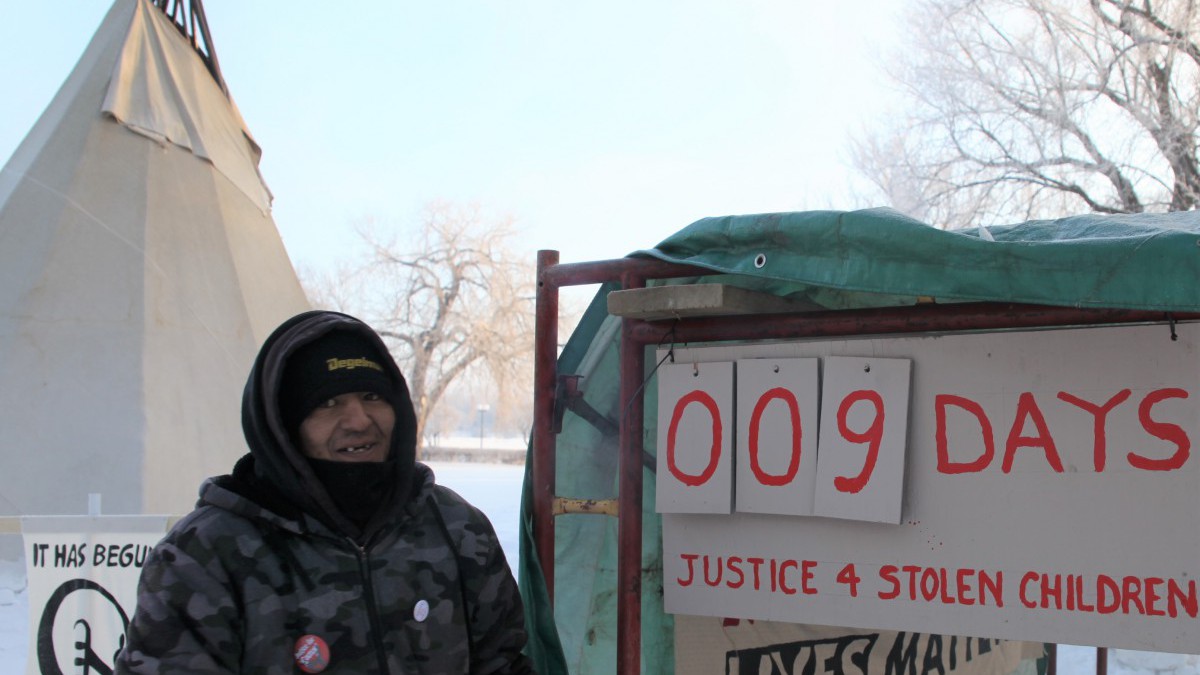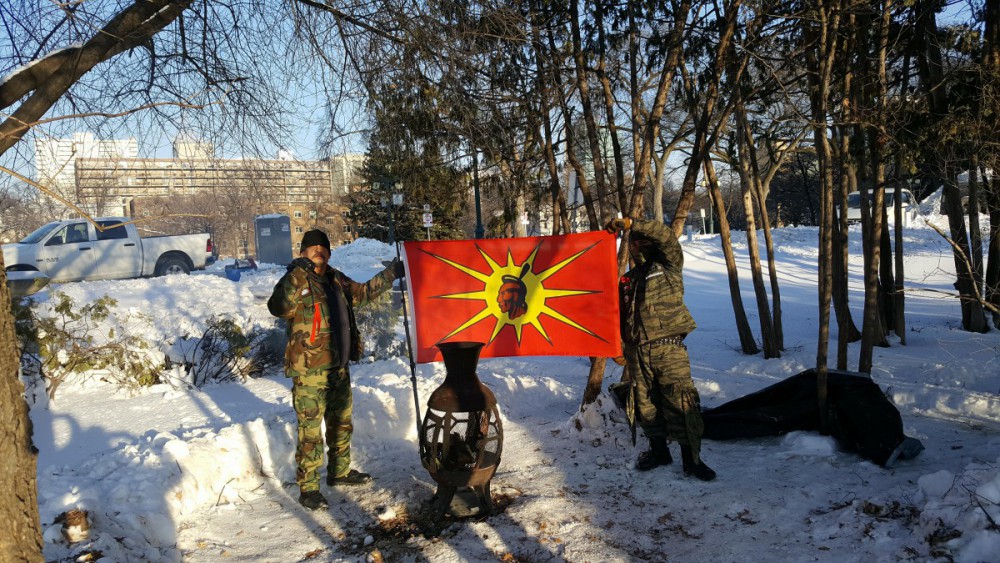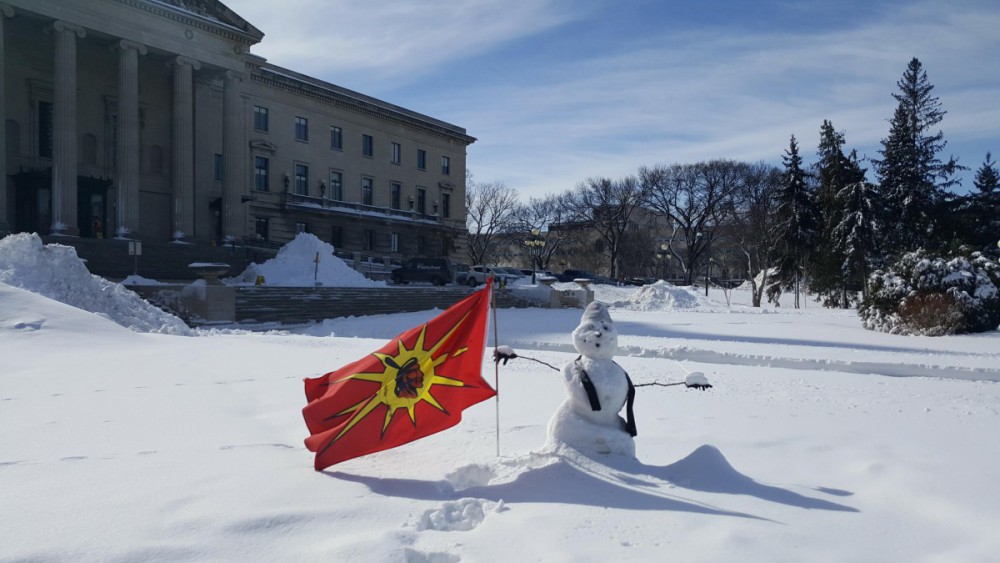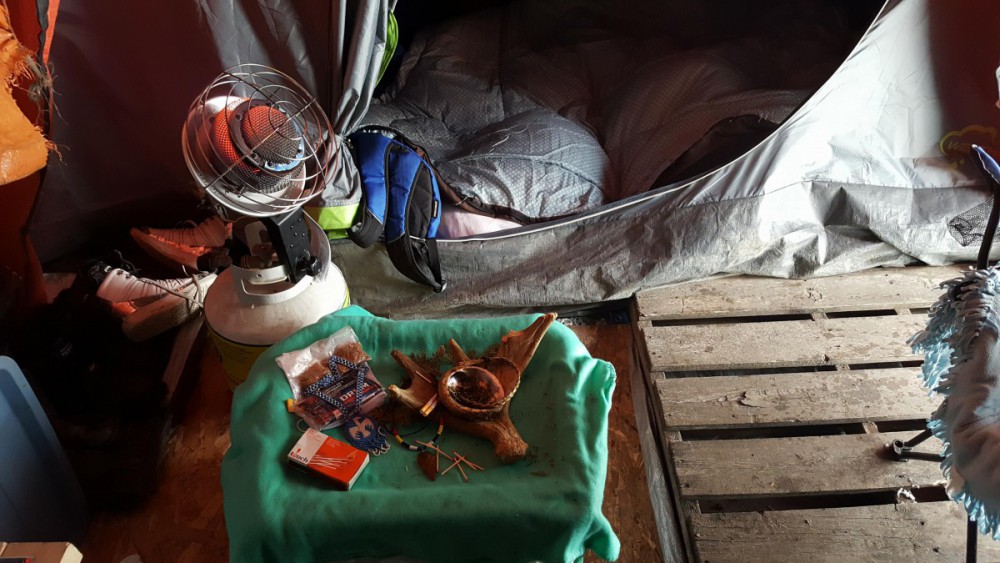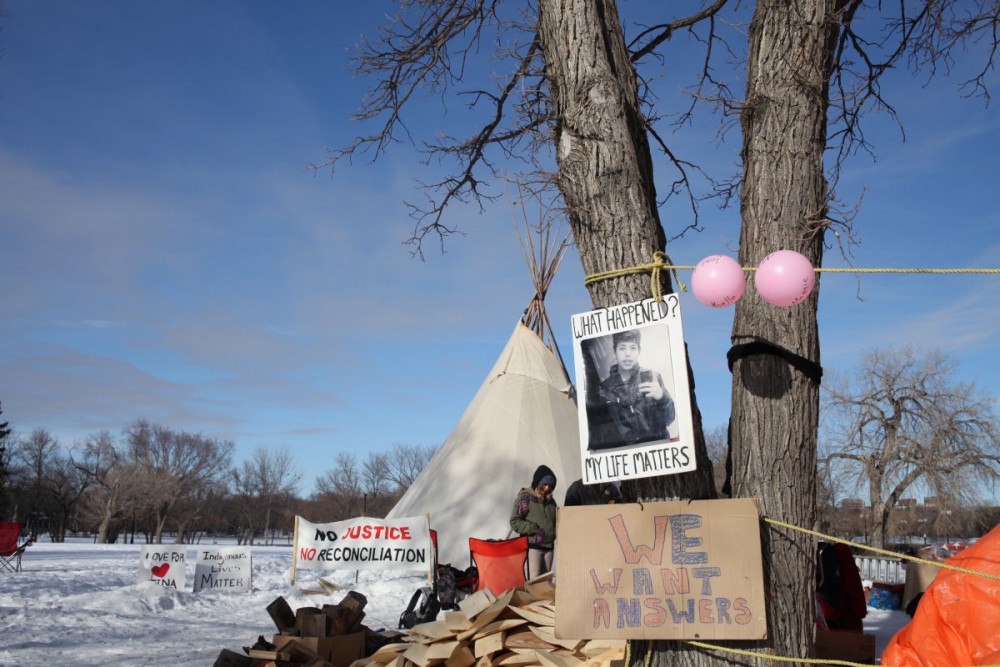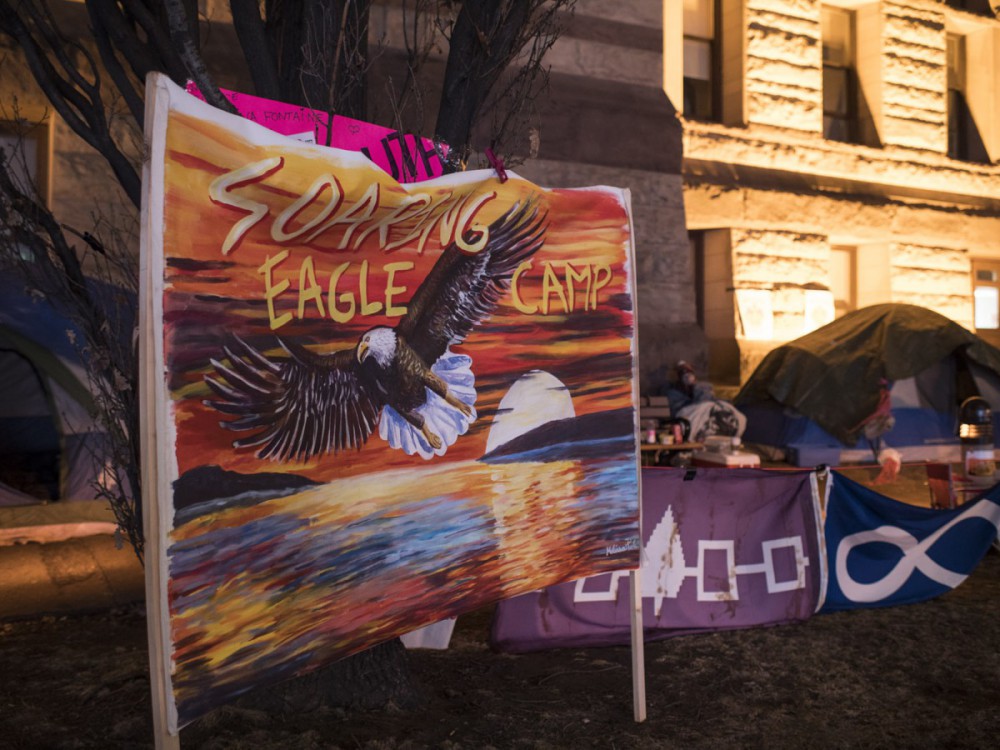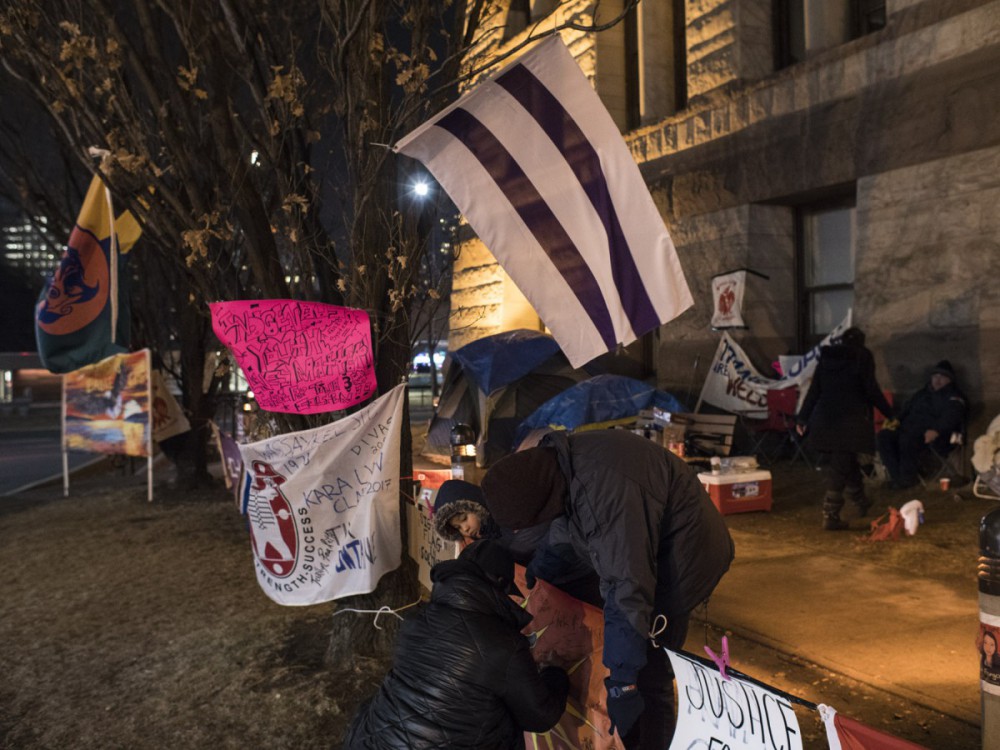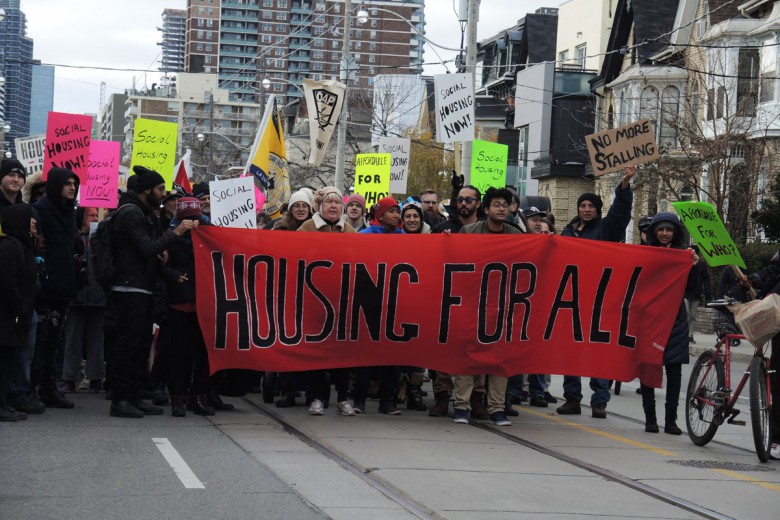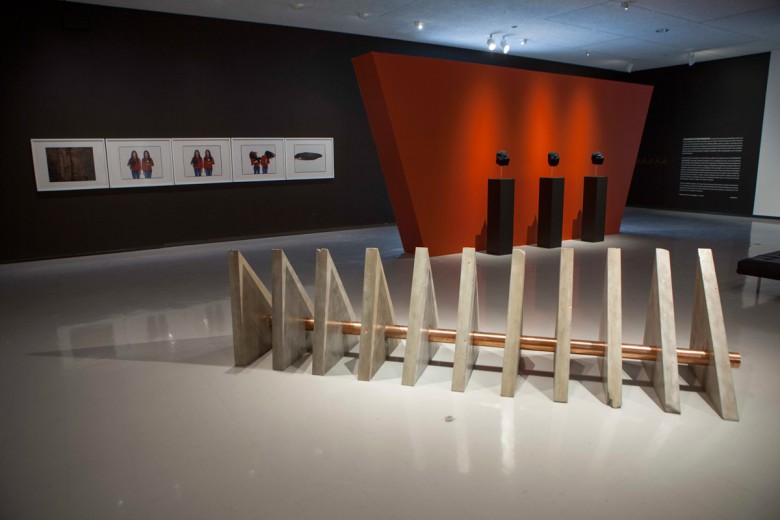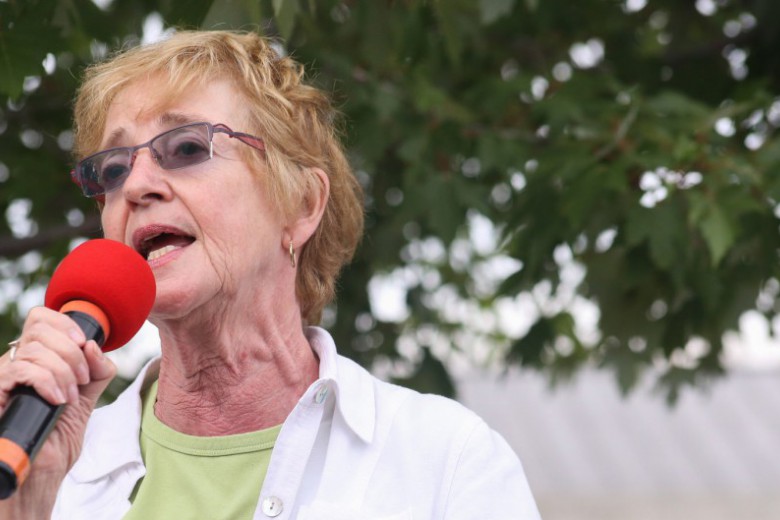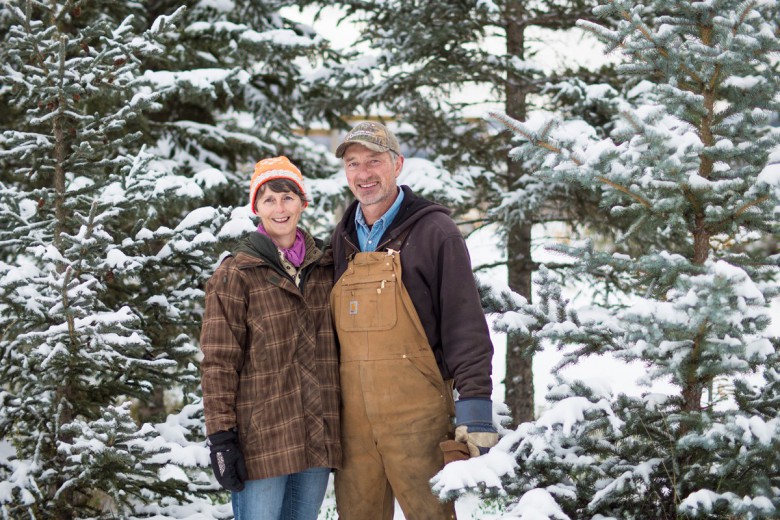Following the Stanley and Cormier acquittals, camps demanding justice for Indigenous children and youth have sprung up in Winnipeg, Regina, Toronto, and Calgary. All but the last remain standing. They’ve been met with varied reception: some with racist insults hurled from passing cars, others with hot coffee and friendly, receptive visitors. We interviewed activists at each of the three remaining camps about their motivation and their visions for justice.
Treaty 1 territory, Winnipeg: Camp No Justice…Just Us
Lisa-Marie DeLaronde, her husband Vern DeLaronde, and her brother Joseph Munro are on day six of holding down the camp in front of the Manitoba Legislative Building on Treaty 1 territory. “Prior to that, Soaring Eagle had put up a camp [led by Darla Contois],” explained Lisa. The first camp was set up immediately after Raymond Cormier was acquitted of the murder of Tina Fontaine, and lasted for around a week.
Two days after setting up their camp, Vern and Joseph wrote two letters, addressed to Manitoba Families Minister Scott Fielding, and Minister of Justice and Attorney General Heather Stefanson, and delivered them to the Legislature. While they wait for a response, they’re watching the inquest into the death of Errol Greene, a 26-year-old Indigenous man who died of a seizure in the Winnipeg Remand Centre after his family says he wasn’t given his medication by Remand Centre staff.
“We want to know why Raymond Cormier wasn’t charged with rape – or something else besides murder – and we also want to know why the [Winnipeg] Remand Center is filled with [almost 70%] Indigenous people – people who have been granted bail, and can’t get out because no-one will bail them out, so they’re in there for the long haul,” explains Vern. So far, no-one from the Legislature has come to speak to them.
Lisa, Vern, and Joe are part of a group called the First Nation Indigenous Warriors. “We consider ourselves frontline workers,” says Joseph. “We were at the Raymond Cormier trial right at the beginning – our group, we took it upon ourselves to stand up for Thelma Favel [Tina’s great-aunt] and the rest of Tina’s family.”
“I have a brother that was murdered,” Joe explains. “So I knew what [the defense] would try and do to Tina: try and tear her life apart, which would devastate her mother and grandmother and her aunt, and all the others who were a part of it. Our goal was to show support, to show that we care, that there are people out here who are not going to stand for the injustices that are happening to our people.“
Lisa, who grew up in an abusive household and was placed in the care of Child and Family Services (CFS) as part of the ‘60s scoop, has seen versions of her own story play too many times. “Personally, how dare CFS say that we would destroy our kids’ lives, when they’re the ones ruining them? How will we, as Indigenous mothers, know how good we’d be as parents if you don’t give us our kids back to find out?” she asks. “I feel very compelled to be there for all these children, and I feel very compelled to be there for some of the mothers who are struggling to be there for their kids.”
“CFS should be held accountable. I believe there should be a lawsuit against them. I have friends who lost their kids, who died in the care of CFS – who were murdered. Babies. My husband’s sister and all her kids were in care, and they were badly raped in the care of CFS. Just endless stories – the monstrous, endless stories. Nightmares that go on.”
Unlike some other camps, including Soaring Eagle’s camp before them, Lisa, Vern, and Joe aren’t asking for more community members to come and camp with them. “It’s too cold to have elders and children out here,” Joe explained. Instead, they’re inviting community members to come by and build a snowman on the lawn in front of the Legislative building.
“My daughter-in law, Bethany Jenelle, she made a snowman, and she calls him No Justice. He stands at the camp with my brother,” Lisa explains. “There’s a little video recording of [Joe] talking about the snowman – who’s gonna be there longer, him or the snowman.”
“If there’s a hundred snowmen, there’s a hundred people out there who have come and supported us,” adds Joe. “And it shows them – up in the offices, looking down at us – if they see a bunch of snowmen, it speaks volumes to the kind of community that’s behind us.”
“They’ve been asking me quite frequently, ‘how long you gonna camp?’” says Joe. “I don’t know. How long are they going to hold out on talking on me? I’ll hold out until it gets warm and then I’ll make my camp bigger.”
In the meantime, they’re hoping for a donation of a ten-person canvas tent to protect them from the elements, and to be able to grow the camp in the spring.
“We went through the blizzard, the rain, the ice, the snow – that couldn’t move us out,” said Vern. “They’ve gotta come and talk to us.”
Treaty 4 territory, Regina: Justice for Our Stolen Children
After he heard on social media that activists in Winnipeg and Calgary had set up camps, Prescott Demas, from Canupawakpa Dakota First Nation, decided to support them in kind. The Regina camp’s name – Justice for Our Stolen Children – makes clear its purpose. “We have a lot of people here – Richelle for one, [lost] her son Haven. She’s pushing for an inquiry for a proper investigation into his [2015] death,” explained Prescott. “You know, all of us, we all have our stories, and a lot of us have kids in foster care, stuff like that. I guess collectively we’re all voicing the same thing.”
“The acquittals really made me angry – both of them together, it was like a double slap in the face,” says Richelle.
The campers have set up a tipi and have about five tents, with a core group of activists who take shifts sleeping in the camp. On Sunday, they hosted a pancake brunch for the community, just as a two-day snowstorm arrived, which blanketed the city in almost 40 centimeters of snow. They’ve also invited Indigenous visitors to bring photos of their children and family members who have faced injustice at the hands of the Canadian state – stolen by CFS, murdered, or neglected.
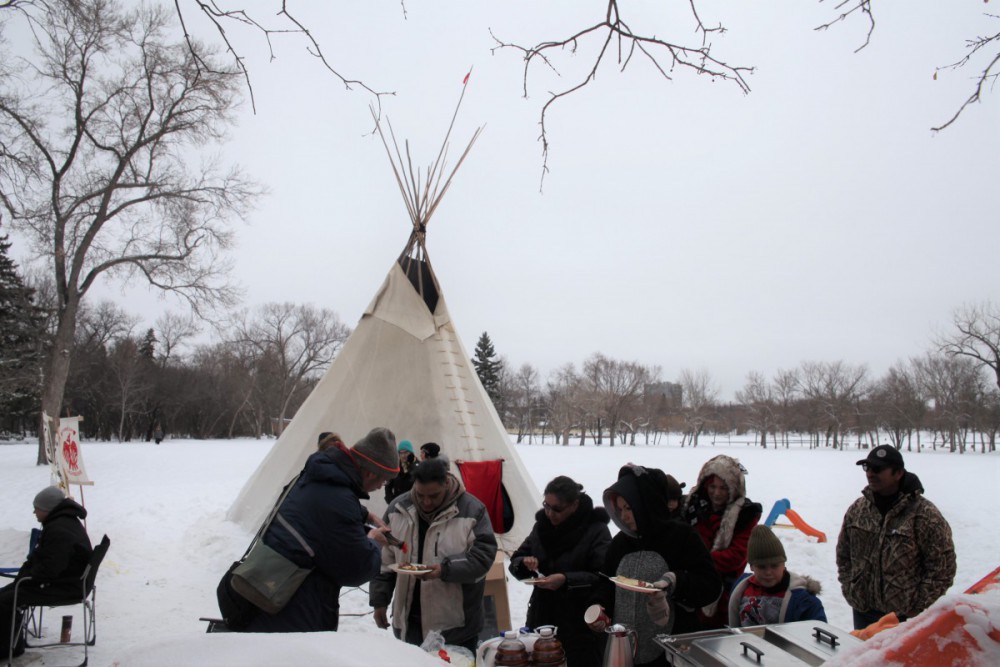
Apart from the police who’ve visited the camp three times to check on it, “We’ve had nobody come out from the legislature,” says Prescott. “They just sent a janitor to come check on us.”
On February 28, the Regina Leader-Post reported that the Wascana Centre Authority, who oversee the Wascana park on which the camp is located, “is working with the group on proper permits to remain during the daytime. “Yet on that same day they came and handed us an eviction notice,” says Prescott. “We also tried to get a porta-potty here [it arrived on site on March 6], and they forced the company to come and pick back up that porta-potty.”
“Me, I want to spread awareness to settler society,” he explains when asked about his motivations. “This whole system itself is not geared to accept Aboriginal people. It was created at a time when [its purpose] was to take our land and our resources and it was meant to keep us oppressed. Separate the people and stop them from joining and rising.”
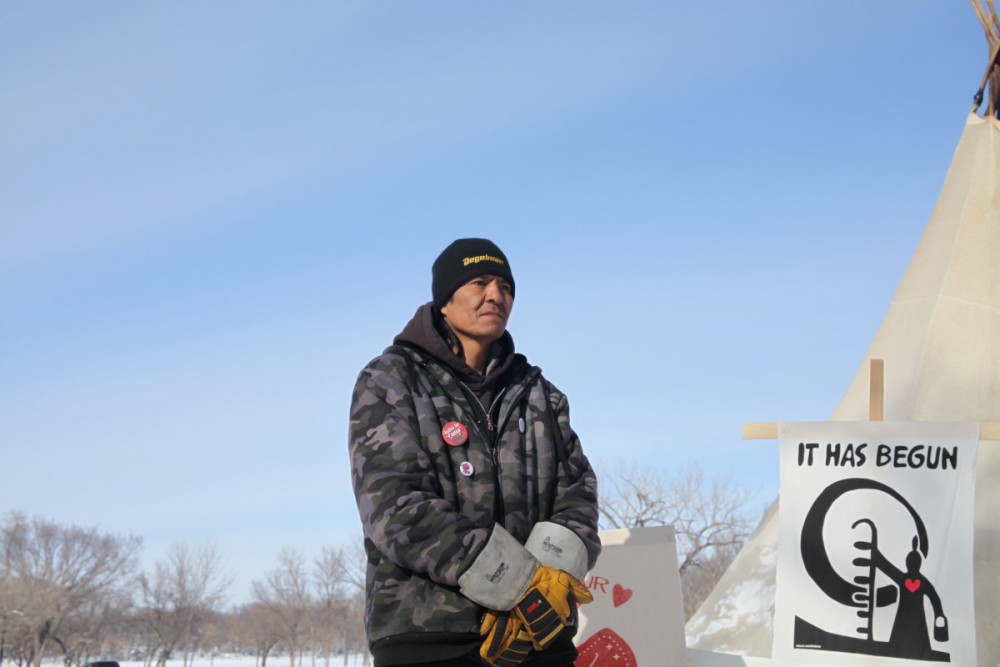
Although many visitors have offered donations of money as support, Prescott says that while the camp does appreciate supplies, they’re focussing on spreading awareness. “So far, everybody who comes in, we welcome them. I encourage them to come back, bring their friends,” says Prescott. He’s been speaking to settlers who visit about the history they likely never learned in school: “the treatment of Aboriginal people [when] this country was taken, and the trauma, the intergenerational trauma that continues through things like residential schools, the Sixties Scoop and foster care.”
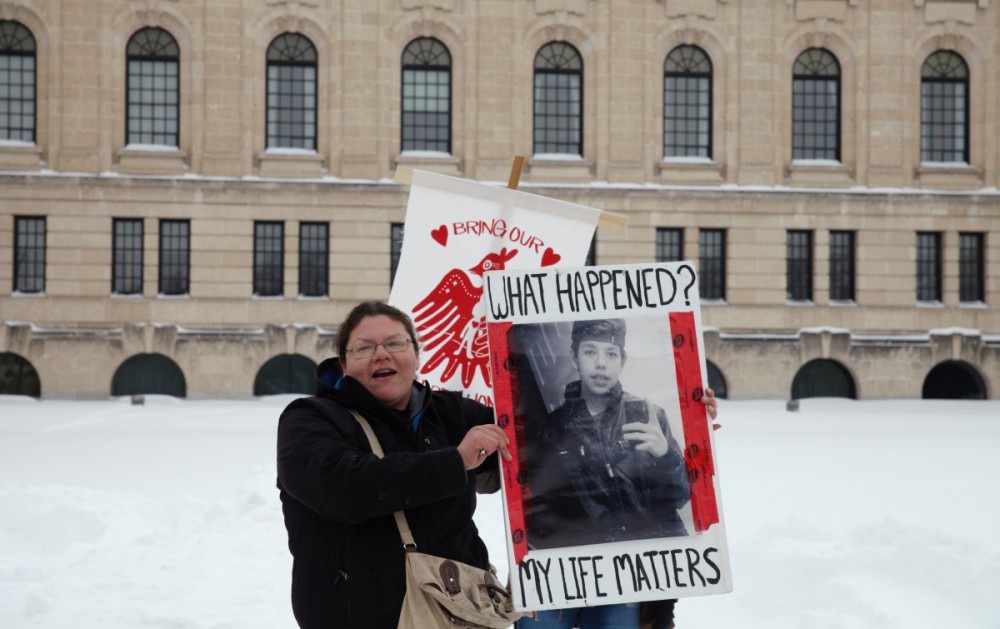
“Something’s gotta change,” says Richelle. “What that is, is unclear – and what justice is, is unclear, considering we’ve never seen justice, we’ve never seen what that looks like in so many cases. […] We’re waiting for action. I’ll sit out here for as long as it takes for something to happen – something positive. Something more than fake promises and words.”
Tkaronto (Toronto): Soaring Eagle’s Camp
“When these acquittals came out I felt the need – and not just me, but I think a lot of people in the community – felt the need to do something more than going to a rally or a vigil or a march,” says Koryn John, an Ojibway woman of the Bear Clan from Rocky Bay (Biinjitiwaabik Zaaging Anishinaabek) First Nation. It was Darla’s Soaring Eagle’s camp in Winnipeg that inspired Koryn, who gathered supporters from the Indigenous Youth Movement and Idle No More to set up camp on March 4, in front of Old City Hall Courthouse in Tkaronto, Treaty 13, Dish with One Spoon Territory.
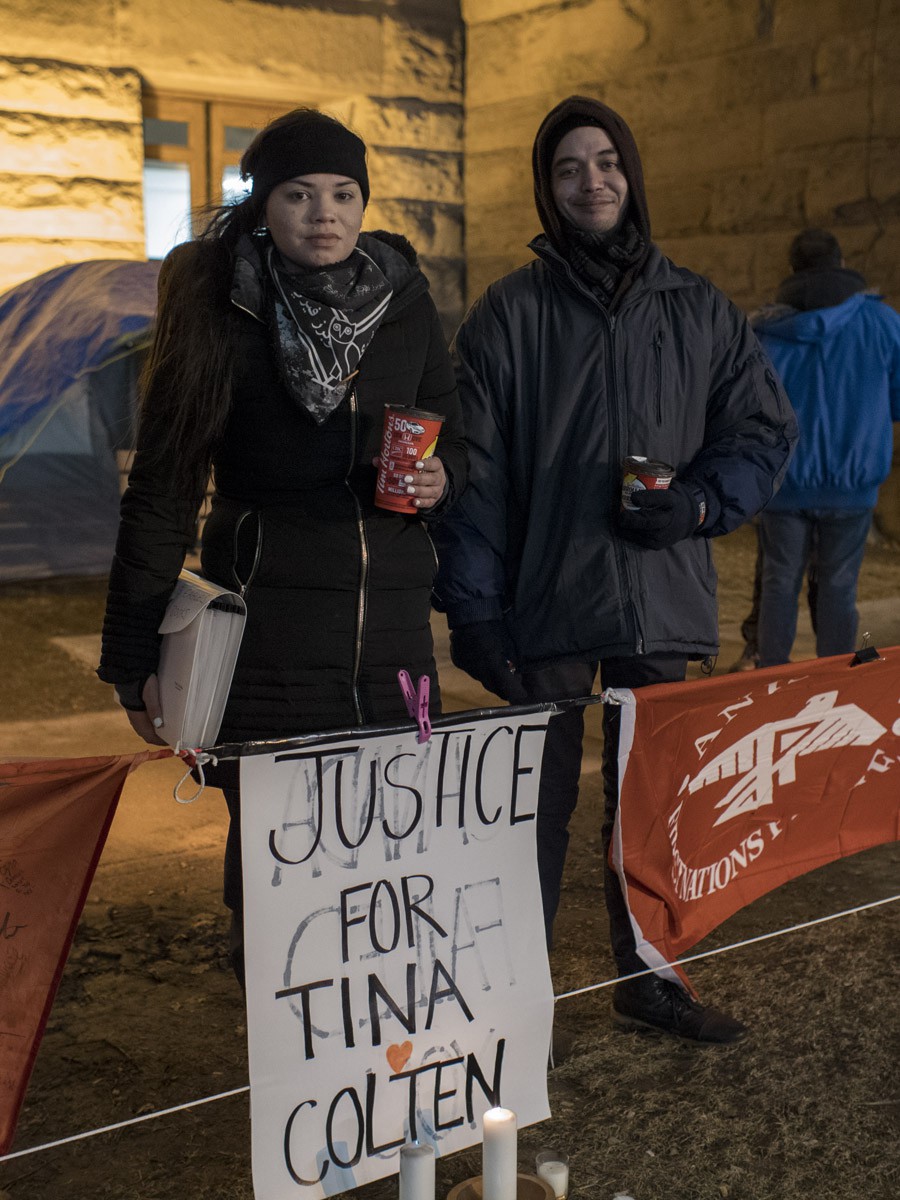
“It’s more powerful that it’s coming from a youth-led camp,” says Koryn. “I think a lot of people are surprised and like to see that, that there is a whole new generation of us that are coming up and speaking out and willing to sleep outside for things like this.
The activists have since been overwhelmed with support. “I was a little nervous at first about starting this up, I was like ‘how are we going to sustain ourselves, how are we going to stay out there and get supplies?’ I had an idea that some people would help out any way they could, but I didn’t know that every 10, 15 minutes would be coming with Tim Horton’s and money,” says Koryn. “People from the inside the Old City Hall [courthouse] have been coming out too and saying ‘you have our support.’”
Though most visitors to the camp have been friendly, Koryn was warned by experienced activists about aggressive visitors. “I’ve had some people come up and they trick you into a conversation like they’re really interested and they really care about Indigenous rights and our people,” says Koryn, “and then suddenly five minutes in there’s a big switch and now they’ve engaged you in this conversation where they’re a little aggressive and they’re kind of shouting.”
Koryn stresses social media’s importance in allowing small on-the-ground actions, like the camps, to punch above their weight. “Even if it’s just following our Facebook page and seeing what we’re up to, [it’s] important in making this thing big and making our voices heard.”
Treaty 7 territory, Calgary: Mohkinstsis
On February 25, Garret C. Smith of the Blackfoot Nation set up camp in front of the Calgary Court Centre. It was taken down under direction of women in the community on Sunday, March 4, and was re-raised on Sunday, March 11, in the same location under the name Mohkinstsis. Mohkinstsis is the Blackfoot word for elbow, and is Calgary’s traditional name.
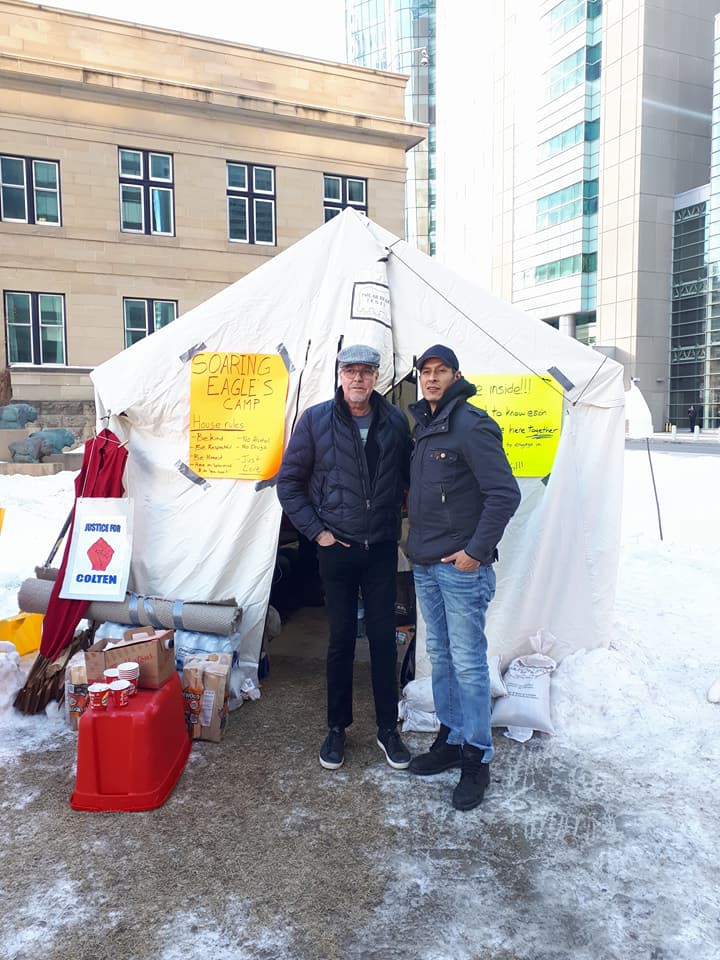
“I have a daughter who is going to be 13, so the Tina Fontaine case really angered me and propelled me to want to do something,” he says. Garret has gained media coverage for his invitations for visitors to ask him “the hard, ignorant, racist questions” about justice for Indigenous people.
According to the Facebook post announcing the relaunch of the camp, the new camp will focus on the “healing of local First Nations members,” and on “building relations with non-native peoples.”


